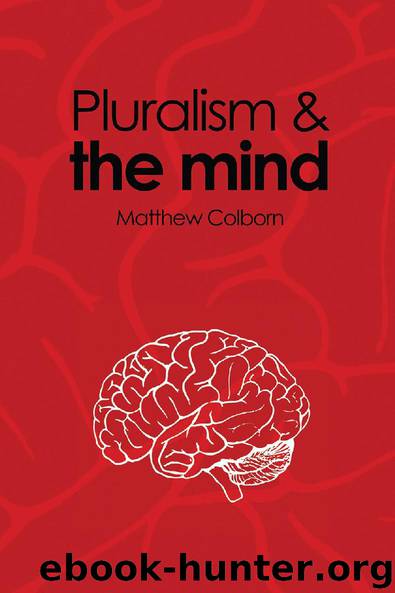Pluralism and the Mind by Matthew Colborn

Author:Matthew Colborn
Language: eng
Format: epub
Tags: psychology, cognition, consciousness, artificial intelligence, ai, emergence, pluralism, philosopy of mind, downward causation, free will, Darwin, onlogy, epistemology, biological causation, neuroimaging, MRI, teleology, evolution
ISBN: 9781845403287
Publisher: Andrews UK Limited 2011
Published: 2011-11-03T00:00:00+00:00
Of these points, (3) should bother us least. Paradigm-led conventional science often misses novel phenomena that is not geared to its specific forms of research. Kuhn noted that ‘Initially, only the anticipated and usual are experienced even under circumstances where anomaly is later to be observed’. [59] The chaotic oscillations of a simple pendulum went unnoticed for centuries before the arrival of chaos theory. [60] Novel approaches often take new research techniques, equipment and observational criteria. The issues often cannot be settled by a simple, single experiment, as Koch and Hepp also suggest.
Stapp’s reply to Koch and Hepp, which Nature declined to publish, was that the arguments of Koch and Hepp missed the point. He pointed out that the von Neumann formalism explicitly brings consciousness into the dynamics and that ‘a conscious experience occurs and the state of the observed system is reduced to the part of itself that corresponds to that experience’. [61] He also claimed that although superpositions were mostly eliminated in the brain, that this did not eliminate the need for process 1. Stapp suggests that by focusing on the elimination of macroscopic superpositions which would disrupt both Penrose–Hammeroff models and quantum computation, they did not address the core issue which is the process 1 free choice.
Stapp’s response covers some but not all of Hepp and Koch’s objections. A key issue is probably point (2), the problem of rigorously analysing large-scale quantum states. Also problematic is the mapping of the interaction between classical and quantum models, which tends to be idiosyncratic even in far simpler, controlled experiments. [62] Stapp’s theory will also probably not be taken seriously until the wider issue of the role of quantum mechanics in biological systems generally is better understood.
Having said this, I think that Stapp’s application of von Neumann’s formulation to these problems is important. The main reason is that, even if he has the details wrong, he has shown that it is possible to violate the closure principle in a way that does not invoke anything like the verboten substance dualism. His dualism is epistemological and formal rather than ontological and substantial, and even if his specific application is inappropriate it indicates that it is at least possible to talk about the world in a formal way that is not wholly deterministic, and inclusive of an active agent. The importance of this development cannot be understated.
Conclusion
Some of the conventional theories above form the basis of reasonably coherent research programmes of neurobiological research, but none really address the deeper philosophical problems of consciousness. The conventional theories tend to cluster close to the ‘representational’ rather than ‘behaviourist’ pole of conventional thinking, mainly because they acknowledge consciousness as a problem. This is significant because it shows that the only way of accommodating consciousness in conventional terms is with some sort of representational approach.
The ‘quantum’ theories, which tend to be inadequately discussed in the mainstream, face similar problems although they do offer ways out of some of the strictures of conventional thinking; Stapp’s theory, which challenges strict determinism, being a salient example.
Download
This site does not store any files on its server. We only index and link to content provided by other sites. Please contact the content providers to delete copyright contents if any and email us, we'll remove relevant links or contents immediately.
| Administration & Medicine Economics | Allied Health Professions |
| Basic Sciences | Dentistry |
| History | Medical Informatics |
| Medicine | Nursing |
| Pharmacology | Psychology |
| Research | Veterinary Medicine |
The Art of Thinking Clearly by Rolf Dobelli(10405)
The 5 Love Languages: The Secret to Love That Lasts by Gary Chapman(9768)
Mindhunter: Inside the FBI's Elite Serial Crime Unit by John E. Douglas & Mark Olshaker(9308)
Becoming Supernatural by Dr. Joe Dispenza(8192)
Nudge - Improving Decisions about Health, Wealth, and Happiness by Thaler Sunstein(7687)
The Road Less Traveled by M. Scott Peck(7581)
Mastermind: How to Think Like Sherlock Holmes by Maria Konnikova(7312)
Enlightenment Now: The Case for Reason, Science, Humanism, and Progress by Steven Pinker(7303)
Win Bigly by Scott Adams(7181)
The Way of Zen by Alan W. Watts(6589)
Factfulness: Ten Reasons We're Wrong About the World – and Why Things Are Better Than You Think by Hans Rosling(4729)
The State of Affairs by Esther Perel(4707)
Gerald's Game by Stephen King(4631)
Man's Search for Meaning by Viktor Frankl(4562)
The Confidence Code by Katty Kay(4242)
Thinking in Bets by Annie Duke(4212)
The Healing Self by Deepak Chopra(3564)
Hidden Persuasion: 33 psychological influence techniques in advertising by Marc Andrews & Matthijs van Leeuwen & Rick van Baaren(3540)
The Worm at the Core by Sheldon Solomon(3475)
